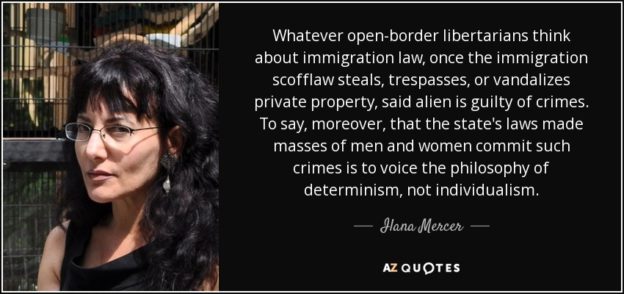Libertarians agree that forced distribution of wealth from those who create it to those who don’t is categorically wrong. Yet in his support for unfettered movement of people across borders, you’ll repeatedly hear the garden-variety libertarian open-border enthusiast say that, “Libertarians don’t care if immigrants use a disproportionate amount of social services.” Why this liberal “generosity” with funds not his own? “Because,” as one such advocate dilettantishly declared, “we believe all social programs should be junked.”
Talk about a petulant non sequitur.
Notwithstanding that nationals pay taxes, from the fact that welfare is expressly wrong for nationals and newcomers alike, why does it follow that it is morally negligible to extend the spoils of the Welfare State to immigrants? How does it follow that increasing the pool of possible offenders is just or desirable? This is like saying that because a bank has been robbed by one set of robbers, there is no need to arrest the next band of bandits.
Besides, the existence of taxpayer-funded services like roads, education, and health care makes immigrants de facto free riders. Anti-discrimination and affirmative action laws further give immigrants legal rights to the property of nationals. As libertarian economist Murray Rothbard put it, this is the quintessential “swamping by the central state of an existing population for political ends.”
Pat Buchanan, then, is mostly correct when he accuses the typical libertarian of being devoted to limitless immigration, and thus to the further enlargement and empowerment of the state, with an exception. Among us are a few who implacably oppose free immigration, on the grounds cogently posed by economist and libertarian extraordinaire, Hans-Hermann Hoppe.
As Hoppe points out, proponents of restricted immigration tend to be advocates of protectionist economic policies; advocates of free and relatively non-discriminatory immigration policies are invariably proponents of free trade. Pat Buchanan fits the former category; his leftist economics and national and cultural conservatism combine in a vehement opposition to laissez faire. Most libertarians fit the latter mold, habitually chanting that free trade is commensurate with the free flow of people across borders.
But it is this tie-in that Hoppe rejects out of hand. Free trade is not only perfectly compatible with restricted immigration, but restricted immigration and free trade are “mutually reinforcing policies,” he says. What the Love-In at the Border libertarian recommends amounts to invasion and forced integration against which government must legitimately protect its citizens.
If we apply the principles undergirding free trade to immigration, then restricting immigration becomes essential. Right now, explains Hoppe, “someone can migrate from one place to another without anyone else wanting him to do so,” but “goods and services cannot be shipped from place to place unless both sender and receiver agree.” This distinction seems almost mischievously trivial, but it penetrates the core. Trade is always invited, consensual and, hence, mutually beneficial to the private property holders that are party to the transactions. When government restricts trade, it violates—not protects—the rights of private property owners to exchange goods and to enjoy freedom of association.
Free immigration, on the other hand, “does not mean immigration by invitation of individual households and firms, but unwanted invasion or forced integration.” When government restricts immigration, it is actually protecting private households and firms from these perils.
Matters would be simple if all libertarians agreed that a constitutional government has an obligation to repel foreign invaders. They don’t, not if they are anarchists. Both open-border and closed-border libertarian anarcho-capitalists posit that an ideal society is one where there is no entity—government—to monopolize defense and justice functions. In a society based on anarcho-capitalism, where every bit of property is privately owned, the reasoning goes, private property owners cannot object if X invites Y onto his property, so long as he keeps him there, or so long as Y obtains permission to venture onto other spaces. Despite their shared anarchism, limited-immigration anarcho-libertarians and free-immigration anarcho-libertarians arrive respectively at different conclusions when they make the transition from utopia to real life.
The latter believe the state must refrain from interfering with the free movement of people despite the danger they may pose to nationals. The former arrive at the exact opposite conclusion: So long as the modern American Welfare State stands, and so long as it owns large swaths of property, it’s permissible to expect the state to carry out its traditional defensive functions. This includes repelling incomers who may endanger the lives and livelihoods of locals.
The open-border libertarian will claim that his is the less porous position. He will accuse the limited-immigration libertarian of being guilty of, on the one hand, wanting the state to take action to counter immigration, but, on the other hand, because of his anarchism, being at pains to find a basis for the interventions he favors. Not being an anarchist, and hence not having to justify the limited use by government of force against invaders, I hope I have escaped these contradictions.
In sum, so long as the U.S. remains a high-wage area, with a tax-funded welfare system, it will experience migratory pressure from low-wage countries. Protectionist policies immeasurably worsen this pressure, because, when people are prevented from selling their wares into foreign markets, they’re more inclined to relocate in search of better economic conditions. Unhampered trade can diminish this pressure.
Real-life immigration, then, can be made to imitate the art of free trade. “By advocating free trade and restricted immigration, one follows the same principle: requiring an invitation for people as for goods and services,” says Hoppe. Or else, it’s Return to Sender.
© By ILANA MERCER
WorldNetDaily.com
January 30, 2002
CATEGORIES: Argument, Free Trade, Immigration, Libertarianism, Paleolibertarianism

 print
print